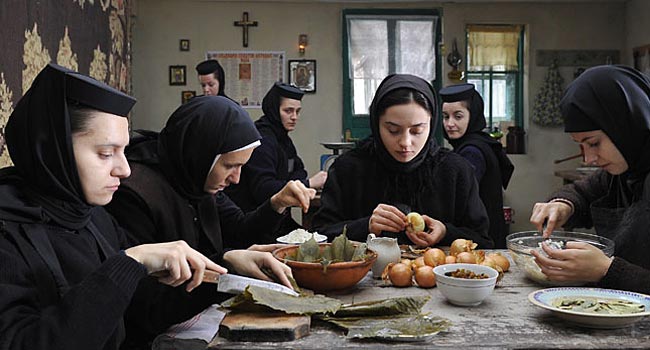
Mungiu’s sense of naturalism, combined with his eye for terrific compositions, help support his mostly subdued script. A near-masterpiece.

Mungiu’s sense of naturalism, combined with his eye for terrific compositions, help support his mostly subdued script. A near-masterpiece.
Faith and love tragically clash in Beyond the Hills, Cristian Mungiu’s latest film since his Palme D’Or-winning 4 Months 3 Weeks 2 Days. Mungiu’s film opens with the reunion of two friends: Voichita (Cosmina Stratan) and Alina (Cristina Flutur). Voichita and Alina grew up together at an orphanage before going their separate ways. Alina moved to Germany while Voichita joined an Orthodox monastery to become a nun. The dynamics of their friendship are made clear in the opening scene; Alina recklessly runs along the train tracks to tearfully embrace her friend, while Voichita complains about being embarrassed.
Alina’s purpose for her visit is to take Voichita to Germany so they can work together, but the plan falls apart once the monastery’s Father (Valeriu Andriuţǎ) finds out about the plan. He tells Voichita that if she leaves there’s no coming back to the monastery. The Father’s decision makes Voichita refuse to leave with Alina. From the very beginning it’s obvious that Alina is madly in love with her friend (Mungiu hints that the two might have been lovers in the past, but it’s never confirmed), and the news they won’t be running off together triggers a breakdown. Alina’s behaviour becomes violent and irrational as she fights the other nuns and tries to throw herself into a well. The church tries to find someone more capable who can take care of Alina but they’re repeatedly turned away, leaving them with seemingly no other option but to take care of the problem themselves.

Mungiu’s sense of naturalism, combined with his eye for terrific compositions, help support his mostly subdued script. The brilliance of Mungiu’s screenplay, based on a true story that was also adapted into a play, is how effortlessly his major themes rise out of the film’s events. Voichita and Alina, having no family or friends to count on, are representative of people at the bottom rung of society’s ladder. Voichita may have found her answer through religion, but Alina is constantly cast aside from the different institutions she’s brought to. The church initially doesn’t want her, knowing that she needs proper help; the hospital is too busy to find out what’s ailing her; her foster parents have no room for her anymore. Once the film reaches its inevitable conclusion and the finger of blame starts getting pointed, it’s clear that fault lies with the failure of these institutions rather than any specific person. Sadly, the people who do the most harm are those with the best intentions.
With a running time of 150 minutes, Beyond the Hills certainly has scenes which earn the film’s status as a slow burner, but the length and Mungiu’s attention to detail have a cumulative effect. Everyone is a victim of circumstance, trying their best to function within a broken system. Mungiu’s morally grey ending makes sure that the question being asked is “Why did this happen?” as opposed to “Who is responsible?” The fact that Mungiu pulls this off so naturally is what makes Beyond the Hills a near-masterpiece.